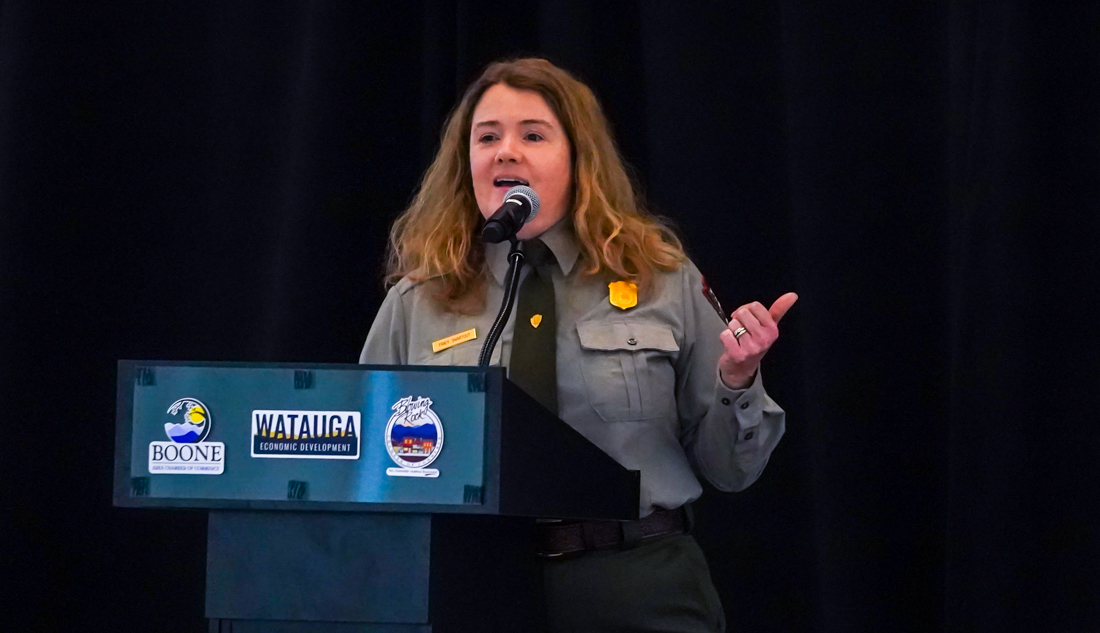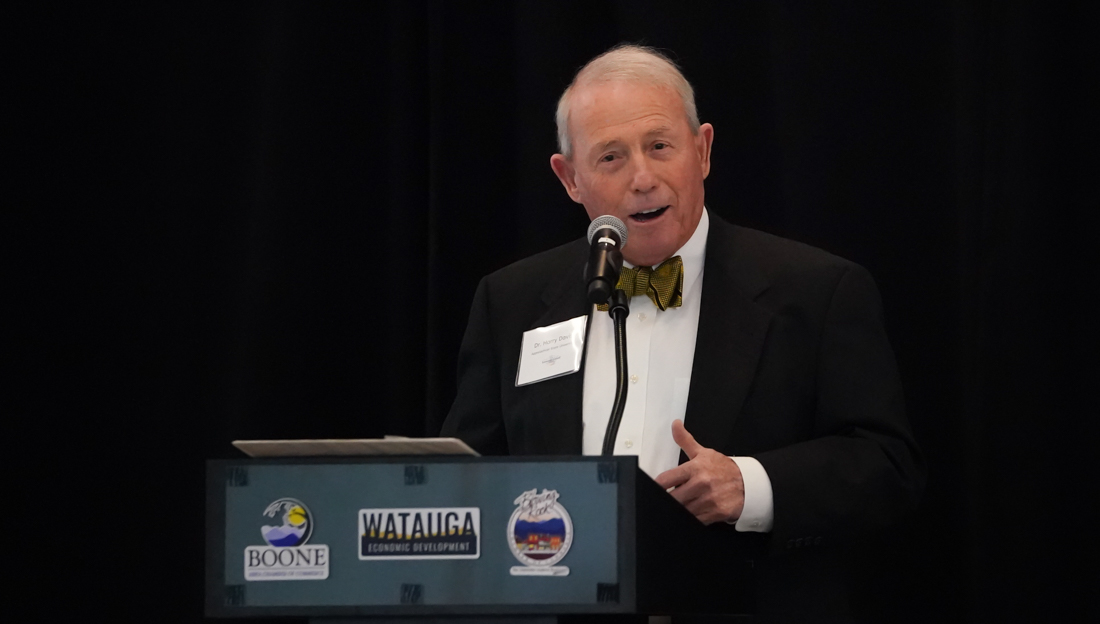By David Rogers. BOONE, N.C. — At first glance, it may seem irrelevant for a sports-focused publication to have a report on economic circumstances, but from the cost of officiating crews to the cost of team transportation expenses, the cost of admission tickets to games and much more, the economy means a lot to sports and its competitions. That’s why High Country Sports was eager to attend the 2023 Economic Kickoff Luncheon on Jan. 19, produced jointly by the Blowing Rock and Boone Area chambers of commerce and hosted at the Grandview Ballroom in App State’s North End Zone Building.
Besides, with “kickoff” in the title of the event and the venue overlooking the region’s premier athletic facility, it certainly sounds sporting. More than 300 local business, civic and government leaders were in attendance and reveled in the food and information.
Nationwide, housing is already in a recession and softness may be just around the corner for the rest of the economy. Those were among the conclusions of North Carolina economist and professor at Appalachian State, Dr. Harry Davis.
Davis noted that since World War II the U.S. has seen 12 recessions with an average duration of about 10 months. He reported that in 2022, the economy grew about two percent, maybe as much as 2.5 percent when the numbers finally come out for the fourth quarter. He suggested that is pretty good performance as a follow-up to the post-COVID-19 growth of 5.7 percent in 2021, which he reported was the best annual growth rate in 40 years.

The longtime economist for the North Carolina Bankers Association said there have only been two real outliers since WWII in terms of the length of a recession, reminding listeners of the 1973-75 recession and what he termed, “the 2008 Great Recession.”
Davis expects the next recession to begin toward the end of 2023 and be relatively mild but, he said, North Carolina should be fairly well insulated because of the state’s strong business climate, population growth, and because the state government has what he termed a “rainy day fund” that will allow the government to operate without significant budget cutbacks.
One of the more interesting tidbits of Davis’ report was that some 350,000 factory jobs will be “reshored” to the U.S. because higher labor costs in China and other countries, as well as higher transportation costs are making offshore manufacturing less attractive to U.S. companies. He stated that he is already aware of both textile and furniture companies in North Carolina bringing operations home, as well as new startups in those industries.

Davis opened some eyes among the small business owners in the audience when he stated that the government is no longer setting the minimum wage for U.S. workers.
“The federal minimum wage rate is at $7.25 per hour, but businesses are not going to wait around for Congress to do anything, so they just do it themselves. Walmart, Amazon, Starbucks, Target and other big companies are now setting the minimum wage,” he said, adding that small businesses are going to have to follow suit in order to recruit and retain employees, even if it is a harsh reality.
Davis’ analysis included a note that, nationwide, there is a shortage of some 5 million housing units.
“What does that mean if you own a house? It means that every night while you are watching TV your house is going up in value four or five hundred bucks a day! Where else could that happen but in this country,” he said. “There is almost no way you can lose money in real estate, in any market, provided you are going to be in there for awhile because there is such a dearth of supply.”

Largely because of rising construction costs, Davis said that housing starts fell about 25 percent, the first decline in housing starts since 2009.
Davis suggested that with an unemployment rate, nationwide, of 3.5 percent, “We can’t be in a recession. If that is a recession, let’s stay in a recession!”
He reported that last year the U.S. created 4.5 million new jobs, the second most in history. The most was in 2021: 6.1 million new jobs. He added that there are about 10.5 million unfilled jobs in the U.S, saying that the number has “bounced around” between 10 million and 11 million ever since the pandemic.
Davis pointed out that the labor participation rate continues to decline, mostly, because many of the Baby Boomers are getting out of the labor force with retirement. Another factor, he said, is that the costs of child care and elder care are skyrocketing, implying that one or the other of previously employed parents are finding it more attractive to stay home.

Dr. Davis noted that the inflation rate is coming down, now to about 6 percent after reaching 9 percent last year. He added that inflation rates of food costs and housing rents remain stubbornly higher, but are still edging down now.
In 2021, Davis said, the Federal Reserve pumped a lot of money into the economy to provide liquidity. “They pushed the pedal to the metal and I think they overdid it,” said Davis. “Then they took their foot off the gas and pushed the brake to the metal. They went from one extreme to the other extreme and that is where we are today. I think they are close to finishing. I wish they would stop raising rates altogether.”
Turning to Watauga County and North Carolina, Davis reported that North Carolina remains stronger than most of the rest of the country because of the tremendous population growth the state has seen. He stated that a net of approximately 900,000 people were added to the population between the 2010 census and the 2020 census.
“It is not because of birth rates,” Davis said, “but because people are immigrating to North Carolina.”
He did point out the unevenness of population growth in the state, which has 50 chartered counties.
“Fifty counties lost population during that time and 50 counties gained,” said Davis. “Unfortunately, the 50 counties that lost population were the 50 counties with the least amount of population to begin with.”

He concluded that the disparity between rural and urban areas only gets worse every year.
Davis reported that in everybody’s ratings, North Carolina is in the “top 5” states for business and some have even rated NC as No. 1. He offered the reasons as low taxes (corporate and individual), a great education system with good community colleges, and the state pension plan is around 86 percent funded. “We also have a great rainy day fund with hundreds of millions of dollars in it,” Davis said. “We can withstand a recession much better now than we could in 2008.”
Davis added that the state is also starting to get “mega deals” of more than one billion dollars in corporate investments.
“With these businesses coming, they are going to need workers,” Davis pointed out. “Our biggest problem is going to be turning out workers with the correct skills to match up with those businesses. We need the educational system to look toward what these new businesses will need.”
Watauga County is the only county among the nine contiguous counties that is seeing meaningful population growth, Davis said. “Only one other of those counties has seen population growth in the last 10 years, and it grew by nine people. Everybody else is losing population in this corner of the state, so we are very lucky to have what we’ve got.”





